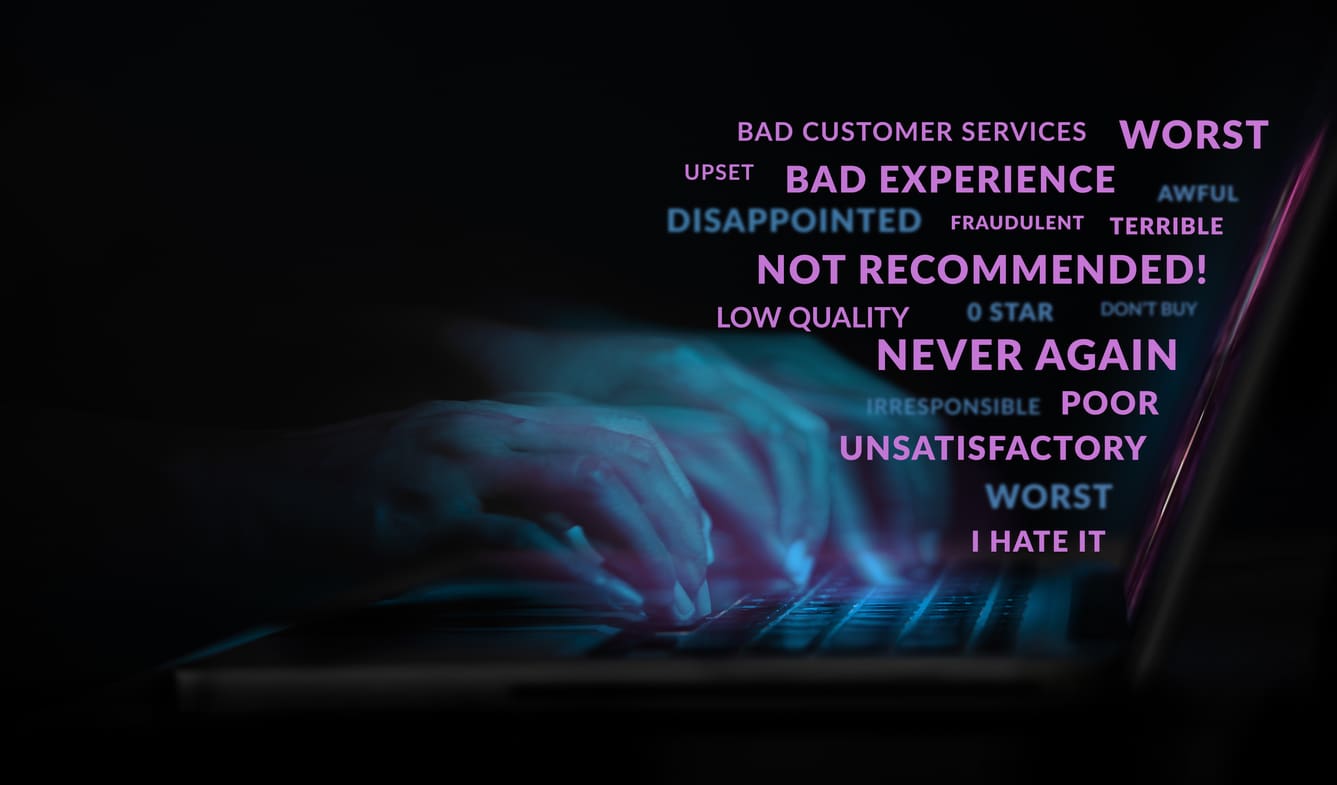
When you manage online reviews, you gain valuable advantages that can help your business thrive.
Every day, people turn to the web to learn about businesses in their area. Some of the first pieces of information in search results is online reviews.
What those reviews say about your business can influence consumer behaviors. Therefore, having good online reputation management is important for all businesses.
Face it, consumers read reviews more than ever before — and ratings on Google reviews and other review sites can make or break your business.
Can you afford to ignore online reviews? Do you wish there was a way to shape the online narrative by controlling your online reviews profile and by creating a response strategy every time someone posts a negative review? The answer to both of those questions is online review management.
In this guide, we will explore how online reviews can influence purchasing decisions and what you can do to protect your business and brand reputation with online review management.
Let’s get started!
Why Do Online Reviews Matter?
According to numerous studies about online reviews, as many as 97% of all consumers indicate they have been influenced by the quality and quantity of reviews read on Google or third-party review websites like TrustPilot, TripAdvisor, and Facebook.
Literally millions of reviews are read by consumers — including your potential customers — every day. Still not sure how important these reviews are? Consider:
- 90% of potential customers read reviews before visiting a business.
- 34% of shoppers always read reviews before making a purchase of a product or company service.
- 80% of consumers indicate that online reviews are trusted as much or more than personal recommendations made by friends or family members.
Customer feedback is essential in growing your business. When these consumers share their experiences online, they are providing word-of-mouth marketing. And, the more reviews you collect, the more your business can grow. In fact, many businesses with higher numbers of reviews tend to generate more revenue than firms with few — or no — reviews.
The Power of Positive Reviews
The facts are in: businesses with positive reviews generate more revenue and have a higher level of trust. Customer reviews are a form of “social proof”, or the level of credibility that customers attach to a product or service. The higher the credibility, the more your reviews can positively influence purchasing decisions.
Statistics show that positive reviews are of tremendous value to business owners. For example:
- Customers are willing to spend as much as 31% more with companies that have great reviews.
- 92% of buyers say that they are more likely to make a purchase when they read positive online reviews about a business on a review site.
- Reviews help a business stand out in online searches; customer reviews posted online are weighted in organic local search results by 6.47% over those business operations without reviews.
Every time customers leave reviews, they are providing you with valuable insights that can help you refine your business delivery. Positive reviews are an indication that you are doing things right — and that can attract prospective customers to your business.
Negative Reviews Can Harm Your Business Reputation
In the online environment, your brand image is critical. When a potential customer reads your digital reviews and those reviews are negative, that can damage your image and your business reputation.
How risky are negative reviews? Consider the following statistics:
- Only 13% of potential customers will consider doing business with a company having 1- or 2-star ratings.
- 94% of consumers indicated that they avoided a business based on negative reviews posted online.
- Even a single negative review can be damaging. Companies may lose as many as 22% of customers when one bad review is posted. If three or more negative reviews appear, the potential for lost customers jumps to nearly 60%.
Negative reviews can stand between you and achieving your goals as a business owner. Savvy consumers are reading your reviews and making decisions about you before ever setting foot in your establishment.
If a bad review appears in search results, or bad reviews are driving more consumers to your competitors, your company may be at risk of lost revenue, lost customers, and a damaged online reputation.
A Look at Google Reviews and Third-Party Review Sites
Google and big review sites receive millions of visitors every day. Because of this traffic, internet reviews feature prominently in Google search results.
Google remains the king of review platforms, with about 63% of all consumers using Google (including search and Google Maps) to read and evaluate business reviews. Google has dominated the review space by incorporating tools to help customers find information quickly, such as review snippets and star ratings, right in search results.
After Google, there are three other major players in the digital reviews field. These are Facebook, Trustpilot and Tripadvisor. In fact, the four sites together are responsible for hosting 88% of ALL digital reviews.
While there are literally hundreds of third-party sites where customers are leaving reviews, business owners need to focus on the major sites in order to build brand awareness, customer trust, and positive online reputations.
From the largest corporations to the small businesses in every community, digital reviews have a direct impact on consumer purchasing behaviors. With this in mind, it is now time to get some expert advice about managing online reviews.
Managing Online Reviews: An Essential Part of Your Digital Marketing Strategy
Now that we have learned how important online reviews are, how can we get the most from our review profiles on Google?
The answer is online review management. As part of your overall marketing strategy, review management helps you control the digital narrative, positioning you for continued success both online and in person. If you are a small business owner, associating your company name with glowing reviews can transform your operations, driving business growth and revenue like never before.
Just like any other digital marketing strategy, review management helps you stand out in competitive marketplaces, especially for local businesses.
Managing online reviews can build and reinforce consumer trust. This strategy can also improve brand awareness. Finally, it can help you protect your online reputation by allowing you to remove harmful or defamatory reviews before they can interfere with your business.
What is Online Review Management?
Every business needs reviews to remain competitive in the digital environment. The solution to generating reviews, responding to reviews, and taking down negative reviews is called online review management.
Online review management is the practice of controlling the digital narrative on review sites across the web. Closely related to brand management, internet reputation firms typically offer some form of review management services to their clients.
Most business owners gain significant benefits from review management, allowing them to create a positive impact on consumer behaviors. This practice is used to respond to reviews across the web, including social media and third-party sites that host reviews.
Four Components of the Review Management Strategy
Every review management strategy is different, yet there are similarities in campaigns. Managing reviews typically consists of four major components:
Review Monitoring
Reputation management professionals begin by analyzing millions of web pages and hundreds of review sites, including popular sites like Google reviews as well as social media platforms like Facebook, Twitter, and Glassdoor.
The goal of review monitoring is to assess consumer sentiment, giving you actionable insights into what consumers are saying about you, your small business, and your brand in the digital environment. This monitoring can also reveal negative reviews before they can cause irreparable damage to your business interests.
Review Responses
When company owners take an active role in their reviews, future customers are more likely to develop trust. Responding to every new review is essential. As part of review management, crafting a response strategy can help deliver consistency and transparency, thereby improving the customer experience.
Small business owners should respond to negative reviews as well as positive ones. By doing so, they are able to own up to mistakes, offer solutions to customers, and reframe the experience. In fact, every time you respond to negative reviews with a positive and understanding message, you are working to restore trust in your brand.
Review Removal
No matter how well you run your company, there will come a time when an unflattering review is posted. New customers confronted with bad reviews may choose to avoid your business entirely, effectively driving them to your competitors.
As shown in the section above, negative ones can cause damage to your reputation, your level of trust between you and consumers, and your overall brand. As a local business operator, this kind of damage can be hard to overcome.
A negative review is only one potential risk. When a disgruntled customer or former employee posts reviews that are false, defamatory, or misleading, you may run the risk of losing a sizeable percentage of your customer base.
That’s why review removal is an integral part of review management. Reputation management professionals use a wide range of tools, including negotiating with review outlets, issuing takedown notices, and flagging harmful reviews for removal.
Review Generation
If you have your own business, you may wonder how you can get more positive reviews from your happy customers. Review management covers that aspect of the review ecosystem as well.
Google and the other review sites do not allow businesses to solicit reviews directly from customers, but there are a few tips that provide workaround solutions. Business owners don’t have to request reviews; instead, they can encourage positive reviews by delivering the best possible products and services.
Remember that every positive review further builds brand awareness and trust; when positive reviewers leave glowing recommendations on review sites and social platforms, this feedback can spur the posting of even more great reviews. And, when social media is leveraged, followers are more likely to share their favorite shops and restaurants with others, further driving business growth.
What About Fake Reviews?
Many company owners see consumer feedback on social media and review sites and wonder if they can somehow “game the system” by getting even more great reviews posted to Google. Can a business owner pay someone to post reviews on the web?
Yes, we’re talking about fake reviews.
In 2021, the Canadian public broadcasting service CBC published an expose on fake Google reviews. According to the article, there’s a growing black market where companies can pay for fake reviews, both positive and negative.
While the temptation is strong, there is one important fact to consider: posting fake reviews violates the terms of use policy of most review sites. Doing so could harm your company more than you think, potentially getting you blacklisted from every review site as well as losing your place at the top of search engine rankings.
In simple terms, fake reviews and fake feedback from customers is no solution. Stick to review requests with your current customer base. Your review management team can help you get the most from this tool, allowing you to thrive even in competitive marketplaces.
Contact OnlineReputation to Learn More
Want to learn more about online review management and the need for an effective online review management strategy? Call OnlineReputation today at 844-230-3803 to speak with brand reputation experts who can help you protect your hard-earned online reputation.
You might also like
Our Top 5 Online Reputation Management Benefits
When you manage online reviews, you gain valuable advantages that can help your business thrive. Every day, people turn to …
